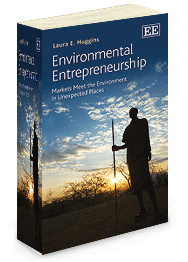
From Kenya’s savanna, where we meet the founders of a private wildlife conservancy, to northwestern China’s Loess Plateau, where we see the emergence of water markets, Huggins shares the stories of environmental entrepreneurs.
Sammy, himself a local Maasai, explained his motivation for helping create the Ol Kinyei Conservancy. … Having witnessed what a neighboring group had accomplished by leasing grazing land for wildlife viewing, Sammy saw the potential for environmental entrepreneurship and, for him, a motorbike.
Jake Grieves-Cook, Sammy’s teammate, is an entrepreneur with tourism experience in Kenya. … Together, their idea was to set aside 8500 of the 200,000 acres being grazed by Maasai cattle for wildlife habitat, and to build a wilderness camp to accommodate guests. Achieving their vision, however, involved more than just putting up tents, providing guides, and serving food. They had to attract wildlife to the land. This process required removing the livestock, which are a way for life for the Maasai. Sammy’s first challenge was to convince the village elders that setting aside a small percentage of the land was a way to diversify their portfolio.
A compelling storyteller, Huggins also takes the reader beyond the anecdote, exploring the institutions which foster environmental conservation, and making policy recommendations to scale up the impact of enviropreneurs.
China has a long way to go in establishing well-functioning water rights systems within an institutional structure where property rights are protected by formal or statutory law. Rights need to be strongly enforced so investors will believe they can make investments that have a better chance of return.
…Given the growing demand for water from the Yellow River Basin and elsewhere in northern China, the need for better delineation of water rights is apparent. This demand, paired with the relatively succesful pilot projects such as the Loess Plateau Watershed Rehabilitation Project and the Grain for Green Program, and the farms to factories projects in Ningxia and Inner Mongolia, has encouraged policymakers to explore bolder schemes.
…If China can continue to respond to environmental challenges with more decentralized decision-making and greater use of market mechanisms, who knows what the future holds – perhaps even the muddy waters of the Yellow River will flow clear.
Drawing from years of research in the field, Huggins builds on the work of Douglass North, Elinor Ostrom, Friedrich Hayek, Ronald Coase, and Terry Anderson to examine the evolution of property rights and markets as tools to enhance local economies and local ecosystems at the same time. Environmental Entrepreneurship is an important contribution to the literature in natural resource management and development economics.
The first chapter is available for free. Download the PDF on the publisher’s website.
The paperback is available for purchase online:
Amazon
Edward Elgar Publishing
Related content:
Laura Huggins – Environmental Entrepreneurship: Markets Meet the Environment in Unexpected Places



